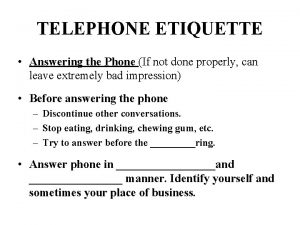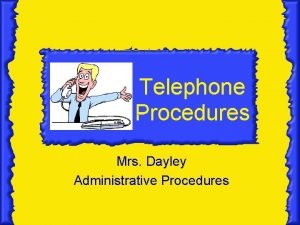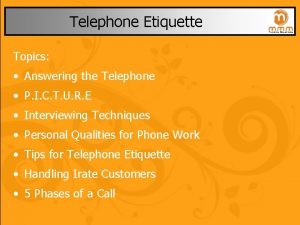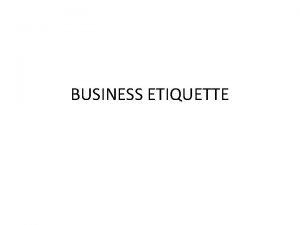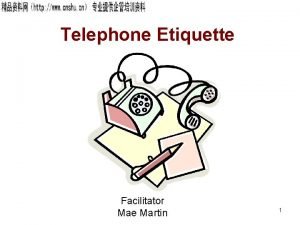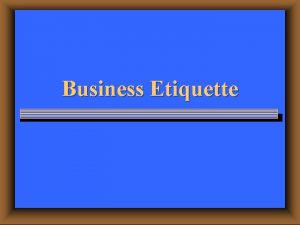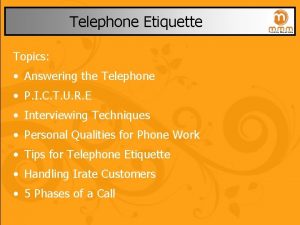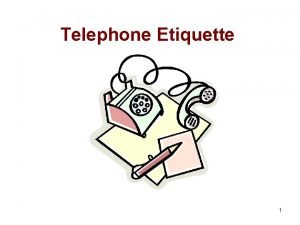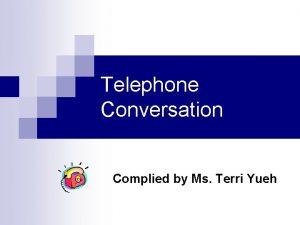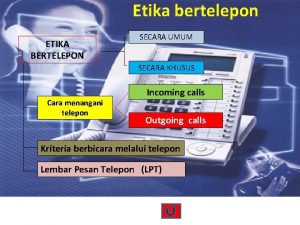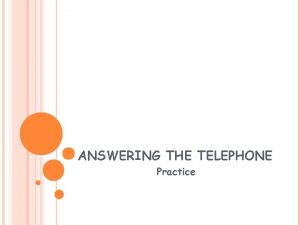Telephone Etiquette Topics Answering the Telephone P I











- Slides: 11

Telephone Etiquette Topics: • Answering the Telephone • P. I. C. T. U. R. E • Interviewing Techniques • Personal Qualities for Phone Work • Tips for Telephone Etiquette • Handling Irate Customers • 5 Phases of a Call

Answering the Telephone 1. Pick up the phone in three rings. More than three rings signals chaos in your office or inattentiveness. 2. Greet the caller, e. g. “hello, ” “good morning. ” Good manners shows you respect the caller. 3. Give your name. This is a courtesy that serves to personalize the customer service experience as well as allowing the customer to hold you accountable for your level of service. 4. Ask the customer if or how you can help. Asking to help tells the customer you are there to serve his/her needs and to solve his/her problems. This also leaves the customer with a positive impression. 5. The greeting is key, it sets the tone and style of the whole interaction. © 2008 MMMTS All Rights Reserved

Telephone Etiquette Words 14% Tone of Voice 86%

Telephone Etiquette Customer forms a mental PICTURE of you. P – PITCH I – INFLECTION C – COURTESY T – TONE U - UNDERSTANDING R – RATE E - ENUNCIATION © 2008 MMMTS All Rights Reserved

Customer Telephone Interviewing Techniques • Open-ended questions / Closed-ended questions • Probing questions • Linking questions • Providing non-verbal encouragement • Using supportive statements • Showing empathy with your client • Key words repetition • Using the pause • Using summaries • Dealing with mistakes • Counterproductive questions • Checking facts & asking for specific information © 2008 MMMTS All Rights Reserved

Personal Qualities for Phone Work • Self-Motivation • Enthusiasm • Determination • Persistence • Sense of Humor • Flexibility • Self-Esteem • Quick thinking • Professionalism • Being thick-skinned © 2008 MMMTS All Rights Reserved

Tips for Telephone Etiquette Before you answer, be prepared: Have your computer switched on. Have pens, pencils, and notepad ready. In answering the phone: Answer calls promptly by the second or third ring. Smile as you pick up the phone. Use your “telephone” voice, controlling your volume and speed. Project a tone that is enthusiastic, natural, attentive and respectful. Greet the customer, and identify your company and yourself. © 2008 MMMTS All Rights Reserved

Tips for Telephone Etiquette In the course of the conversation: Focus your attention on the customer. Enunciate/articulate clearly. Speak distinctly. Use simple English – avoid slang and/or acronyms. Use action specific words and directions. Use the customer’s name during the conversation. Always speak calmly and choose your words naturally. © 2008 MMMTS All Rights Reserved

Tips for Telephone Etiquette Avoid forbidden phrases: “ I don’t know. ” “I/we can’t do that. ” “You’ll have to…. ” “Just a second. ” “No. ” © 2008 MMMTS All Rights Reserved

Handling Irate Customers The first step in handling an irate caller is to simply hear the other person out. Listen intently. Allow the customer to vent some frustration. Empathizing allows you to understand another person’s motives without requiring you to agree with them. © 2008 MMMTS All Rights Reserved

Five Phases of a Call Phase 1 Opening the Call (Greeting & Introduction) © 2008 MMMTS Phase 2 Building Rapport & Identifying Customer Need (Question) Phase 3 Phase 4 Collecting/ Verifying of Information Provide Customer Solutions, Alternatives or Information (Paraphrase) Phase 5 Get Customer Buy-in; Establish Next Steps; Close the call (Summarize) All Rights Reserved
 Telephone answering etiquette in business
Telephone answering etiquette in business Telephone answering procedures
Telephone answering procedures Telephone etiquette definition
Telephone etiquette definition Define telephone etiquette
Define telephone etiquette Short voicemail greetings personal
Short voicemail greetings personal Telephone etiquette introduction
Telephone etiquette introduction Telephone etiquette introduction
Telephone etiquette introduction Objectives of telephone etiquette
Objectives of telephone etiquette Telephone
Telephone What is telephone etiquette
What is telephone etiquette Chapter 30 seeking employment
Chapter 30 seeking employment Naysayer examples
Naysayer examples
